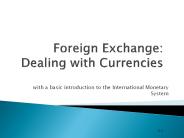Foreign Exchange
Title:
Foreign Exchange
Description:
Title: Foreign Exchange & International Trade Finance. Author: Raheel Ahmad Last modified by: IMRAN Created Date: 5/1/2005 3:59:23 PM Document presentation format – PowerPoint PPT presentation
Number of Views:6
Avg rating:3.0/5.0
Title: Foreign Exchange
1
(No Transcript)
2
Shariah Foundation and Applications of Islamic
Microfinance
What is Microfinance?
- By Abdul Samad
- AlHuda Centre of Islamic Banking Economics
(CIBE)
3
What is Microfinance?
- Microfinance is usually defined as the provision
of financial services and products to those whose
low economic standing excludes them from
conventional financial institutions. - Micro-finance offer of financial services
- such as loans, savings, insurance, and training
to people living in poverty.
4
Structure of Microfinance Institutions
5
The Aim of Microfinance Institutions
- To focus on people who generally did not have the
means to Fund - For example, a farmer needing seeds to plant for
produce was given a loan for cash at interest
rates - New Business
- The people who want to be self sufficient but do
not have a ready business idea or skill. This
effort gave individuals and families the
financial fuel they needed to stand on their own
feet. - Borrowers used loan proceeds to buy raw materials
to manufacture products for sale in the market
purchase livestock to sell milk/eggs or open
small shops.
6
Some Very Important Shariah Principle About
Islamic Finance
- Money is not an asset by itself and can increase
in value only if it joins other resources to
undertake productive activity. - Fund providers must share the business risk.
- Assets must back the transactions and investments
may be made only in real, durable assets. - Islamic funds cannot finance activities deemed
inconsistence with Shariah such as, business
related to alcohol, gambling, any sort of trading
of pork etc. - Islamic finance contracts required for mutual
agreement and stipulates exact terms and
conditions.
7
Tools of Islamic Microfinance
- Charity
- Islamic jurists have unanimously held the view
that it is the collective obligation (fard
kifayah) of a Muslim society to take care of the
basic needs of the poor. - Charity occupies a central position in the
Islamic scheme of poverty alleviation. - When compulsorily mandated on an eligible Muslim,
sadaqa is called zakah. - Zakah is the third among five pillars of Islam
and payment of zakah is an obligation on the
wealth of every Muslim based on clear-cut
criteria. - These funds are meant mostly for the extremely
poor and function as a safety net for meeting
their immediate and basic needs - In flow of benefits that are expected to be
stable and permanent (such as, through endowment
of a physical property), it is called sadaqa
jariya or waqf.
8
Economic Empowerment
- Islam strongly encourages charity from the
givers point of view, it seeks to minimize
dependence on charity from the beneficiarys
point of view. - A man of the Ansar community came to the Prophet
(peace be upon - him) and begged from him. (1)
- He (the Prophet) asked Have you nothing in your
house? He (the man) replied Yes, a piece of
cloth, which we wear, or which we spread (on the
ground), and a wooden bowl from which we drink
water. (2)
9
Economic Empowerment
- He (the Prophet) said Bring them to me. He (the
man) then brought these articles to him and he
(the Prophet) took them in his hands and asked to
the assembly of people Who will buy these? A man
said I shall buy them for one dirham. He (the
Prophet) asked twice or thrice Who will offer
more than one dirham? Another man said I shall
buy them for two dirhams. (3) - He (the Prophet) gave these to him and took the
two dirhams and, giving them to the man of the
Ansar, he said Buy food with one of them and
hand it to your family, and buy an axe and bring
it to me. (4) - He then brought it to him. The Prophet (peace be
upon him) fixed a handle on it with his own hands
(5) and said Go, gather firewood and sell it,
and do not let me see you for a fortnight. (6) - The man went away and gathered firewood and sold
it. When he had earned ten dirhams, he came to
him and bought a garment with some of them and
food with the others. (7) - The Prophet (peace be upon him) then said This
is better for you than that begging should come
as a spot on your face on the Day of Judgment. - Begging is right only for three people one who
is in grinding poverty, one who is seriously in
debt, or one who is responsible for compensation
and finds it difficult to pay. (8)
10
160 B First Floor, Ahmad Block, New Garden
Town, Lahore - Pakistan. Ph (92-42) 35913096 -
98, Fax (92-42) 35913056 Email
info_at_alhudacibe.com www.alhudacibe.com































